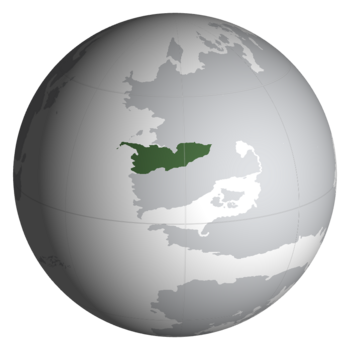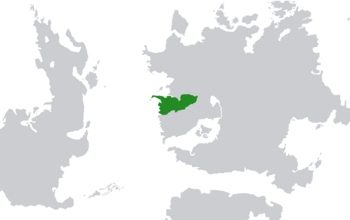Difference between revisions of "Kivu"
| Line 100: | Line 100: | ||
{{main|Politics of Kivu}} | {{main|Politics of Kivu}} | ||
| − | + | == Government and Politics == | |
| − | + | Kivu has been a federal parliamentary republic and a representative democracy since the [[1950 Constitution|1950 Constitution of Kivu]], went into effect on 1 January 1950, after being ratified on 17 August 1949, following the [[August 17th Coup D’etat]]. | |
| + | |||
| + | Legislative power is held by the unicameral, [[Federal Parliament of Kivu]] ([[Kivuian language|Kivuian]]: ''Bundesparlament''). The Bundesparlament is made up of 411 members, one from each of the 376 municipalities, and with an additional 25 members from each of Kivu’s 25 largest cities. Each member of parliament, including the chancellor and their cabinet are elected to four-year terms, they may serve no more than 2 consecutive terms, and may not serve more than five total terms. | ||
| + | |||
| + | After parliamentary elections, the new parliament elects the [[Chancellor of Kivu]], usually the highest ranking Member of Parliament from the largest party in Parliament. After being selected, the chancellor then nominates ministers to serve in their cabinet, and parliament then votes to approve the chancellor’s nominations. The chancellor and their cabinet exercise the government’s executive powers. [[Alexandra Berkhoff]] is currently the chancellor of Kivu. | ||
| + | |||
| + | The [[President of Kivu|president]] serves as the head of state and Commander-in-chief of the [[Kivuian Armed Forces]]. However, following the ratification of the 8th Amendment, which stripped the president of most remaining executive powers, the president has served in a representative role. The president did retain the power to veto any legislation passed by Parliament, and the power to issue an executive order, although these powers have not been used very often. As part of the system of checks and balances put forth by the amendment and the constitution, Parliament can overturn either action with a 3/4ths majority vote. [[Jackob Fitkau]] is the current and TBD president. | ||
| + | |||
| + | Presidential elections are held every five years, the last one was held in [[2022|2020 Kivuian Presidential Election]], and the next one will be held in [[2025|2025 Kivuian Presidential Election]]. Presidents are only permitted by the constitution to serve for 2 total terms. | ||
| + | |||
| + | Since the 12th constitutional amendment was ratified in 1984, Kivu’s electoral system has used [[instant run-off voting]], also called preferential voting, for all elections. The 16th Amendment also made voting compulsory for all registered citizens over the age of 18. Citizens who fail to vote, unless given an exemption from their provincial government, face penalties ranging from a $25 Thaler fine to a month in prison, depending on the number of times that they have failed to vote. | ||
== Infrastructure == | == Infrastructure == | ||
Revision as of 00:14, 22 February 2024
Republic of Kivu Republik Kivu | |
|---|---|
Motto: "Durch Einigkeit entsteht Fortschritt" "Through unity comes progress" | |
Anthem: Die Nationalhymne "The Kivuian National Anthem" | |
Territory controlled by Kivu shown in dark green. | |
| Capital and largest city | Buchthafen |
| Official languages | Kivuian |
| Ethnic groups (2022) | |
| Religion (2022) |
|
| Demonym(s) | Kivuian |
| Government | Unitary parliamentary republic |
| Jakob Fitkau | |
| Alexandra Berkhoff | |
| Legislature | Parliament |
| Formation | |
| Population | |
• 2022 census | |
| GDP (nominal) | 2022 estimate |
• Total | |
• Per capita | |
| HDI (2020) | very high |
| Currency | Thaler (KTH) |
| Time zone | AMT+6 (Kivuian Mountain Time, KMT) AMT+7 (Kivuian Standard Time, KST) |
| Date format | DD-MM-YYYY |
| Driving side | right |
| Calling code | +28 |
| Internet TLD | .kv |
Kivu (Kivuian: /ˈkiːvuː/), or the Republic of Kivu (Kivuian: Republik Kivu /ʁeˈpuːblɪk ˈkiːvuː/), is a country located in Ecros. It shares borders with Karimun to the north, Araucarlia and Pennalla to the south, and Jackson to the east, with the Kivu Ocean to the west. Kivu covers 5,892,392 sq km (2,275,065 sq mi) and is home to 62.5 million people. The nation's capital and largest city is Buchthafen.
Kivu is a parliamentary representative democracy with a popularly elected president as head of state and a prime minister as head of government. It is a developed, possessing a robust market economy, ranking as Terraconserva's eleventh-largest by nominal GDP (the third largest in Ecros), and scores as a highly developed nation on the Human Development Index. Additionally, Kivu holds membership in the Terraconserva Council of Nations and is one of the three founding member states of the Alliance of Central Ecrosian States.
Contents
Etymology
The name "Kivu" is believed to originate from the ancient Kivuian term for land, Gibergvü. This name is a combination of the words "gibirgi," meaning mountains or hills, and "vü," indicating many. Over time, the prefix "Gi-" in Gibergvü evolved into "Ki-" and eventually led to the name becoming "Kibervü" around 1000 A.D. By the late 1300s, the name simplified to "Kivu."
History
Geography
Kivu is located in western Ecros and is considered a part of central Ecros, between latitudes 20° and 27° N, and longitudes 81° and 117° W. The country is bordered by Karimun to the north, Araucarlia and Pennalla to the south, Jackson to the east, and the Kivu Ocean to the west. The country's total area is 1,751,200 square kilometers (676,143 sq mi), the 22nd largest country in the world, and the tenth lagrest in Ecros.
Kivu has 3,277 square kilometers (2,036 sq mi) of coastline, including X.
Within its boundaries, Kivu has two prominent mountain ranges, the X Mountains and the Y Mountains. The X Mountains lie predominantly in northern Kivu and form the southern part of the Karimunese subcontinent. The range's highest point is Mount X, reaching an elevation of (m or ft). The Y mountains, located in the eastern part of the country, form the Jackian-Kivuian border. The highest point in Kivu, Mount Y (m or ft), is located in the Y mountains in the (part) of Düsuntberg.
Climate
Kivu has a diverse range of climates ranging from rainforests and tropical savannas on the coast, to forests and grasslands in the central regions, to desert and drier forests and grasslands in eastern Kivu.
Many factors influence the climate of Kivu, such as the Kivu Ocean, the X mountains, and the Y mountains. Warm water and humdity from Kivu ocean influences the climate of western Kivu, summers are wet and warm, while winters are warm and relatively dry.
Economy
Kivu's economy is a mixed-market economy, centered around social market economy (SOME). The country has the sixth-highest GDP per capita among Erosian nations and ranks tenth globally. The service sector is the largest contributor to the economy, making up around 46.4% of GDP, followed by manufacturing (31.2%) and agriculture (22.4%). Most of Kivu's GDP, around 75%, is generated in cities, with Buchthafen serving as the largest economic hub. The coastal and central regions, particularly in the TBA and TBA metropolitan areas, house the majority of industries, businesses, and financial institutions. TBA is Kivu's economic capital.
The welfare state in Kivu was established during the 1970s and expanded in the early 2000s through increased taxes and successive social reforms. These efforts transformed the nation into one of the most developed and egalitarian countries in Terraconserva. Kivu consistently ranks high in global health, literacy, and human development indices, claiming the sixth-highest HDI among nations. With a reputation for sound governance and stability, Kivu is one of the least corrupt countries. Contractual agreements are complied with strictly, and property rights are well protected. Kivu maintains strict regulations to prevent exploitation of both its people and resources. While generally popular among Kivuians, some view these regulations as limiting economic potential.
Government and politics
Government and Politics
Kivu has been a federal parliamentary republic and a representative democracy since the 1950 Constitution of Kivu, went into effect on 1 January 1950, after being ratified on 17 August 1949, following the August 17th Coup D’etat.
Legislative power is held by the unicameral, Federal Parliament of Kivu (Kivuian: Bundesparlament). The Bundesparlament is made up of 411 members, one from each of the 376 municipalities, and with an additional 25 members from each of Kivu’s 25 largest cities. Each member of parliament, including the chancellor and their cabinet are elected to four-year terms, they may serve no more than 2 consecutive terms, and may not serve more than five total terms.
After parliamentary elections, the new parliament elects the Chancellor of Kivu, usually the highest ranking Member of Parliament from the largest party in Parliament. After being selected, the chancellor then nominates ministers to serve in their cabinet, and parliament then votes to approve the chancellor’s nominations. The chancellor and their cabinet exercise the government’s executive powers. Alexandra Berkhoff is currently the chancellor of Kivu.
The president serves as the head of state and Commander-in-chief of the Kivuian Armed Forces. However, following the ratification of the 8th Amendment, which stripped the president of most remaining executive powers, the president has served in a representative role. The president did retain the power to veto any legislation passed by Parliament, and the power to issue an executive order, although these powers have not been used very often. As part of the system of checks and balances put forth by the amendment and the constitution, Parliament can overturn either action with a 3/4ths majority vote. Jackob Fitkau is the current and TBD president.
Presidential elections are held every five years, the last one was held in 2020 Kivuian Presidential Election, and the next one will be held in 2025 Kivuian Presidential Election. Presidents are only permitted by the constitution to serve for 2 total terms.
Since the 12th constitutional amendment was ratified in 1984, Kivu’s electoral system has used instant run-off voting, also called preferential voting, for all elections. The 16th Amendment also made voting compulsory for all registered citizens over the age of 18. Citizens who fail to vote, unless given an exemption from their provincial government, face penalties ranging from a $25 Thaler fine to a month in prison, depending on the number of times that they have failed to vote.



